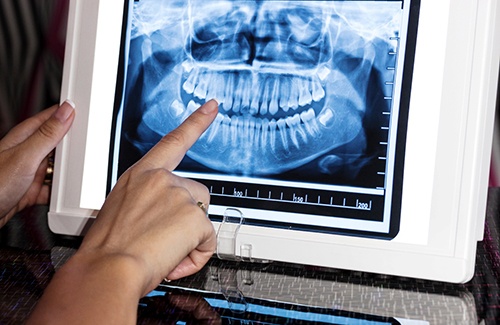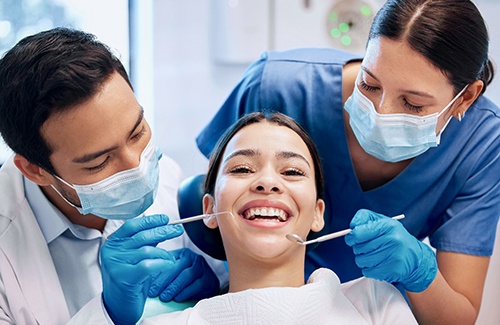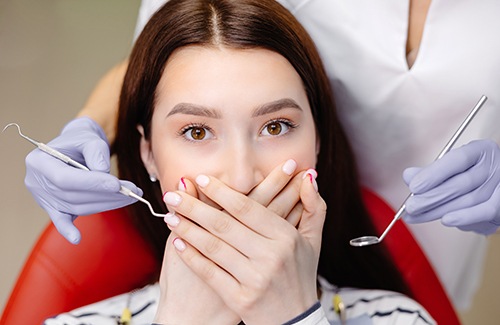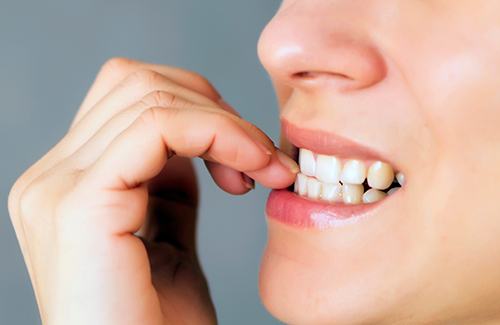Emergency Dentist – Grantsville, UT
Delivering the Urgent Care Your Smile Needs

There are plenty of beautiful places to roam throughout the state of Utah. While taking in the beauty of surrounding landscapes, it’s also possible that you might suffer a dental emergency that requires immediate attention. Whether you’re out on a hike with friends and accidentally fall, chipping a tooth, or you’re preparing to enjoy a juicy apple when tooth sensitivity strikes, you can call our emergency dentists in Grantsville and get the help you need right away.
Why Choose Frandsen Dental of Grantsville for Emergency Dentistry?
- Two Forms of Sedation Available
- Same-Day Emergency Care
- Natural Materials Used to Repair Damaged Teeth
How We Treat Dental Emergencies

- Call our office for an appointment – When dealing with a dental emergency, you’ll first need to call our office to schedule an appointment. A member of our team will determine how severe the injury is and make recommendations to help safeguard your smile while at home.
- Undergo an emergency exam – Once reaching our office, we will begin to take X-rays of your smile and use innovative technologies to pinpoint the problem area.
- Create a personalized treatment plan – Our findings will help us to determine the type of treatment plan you need. Based on the damage and severity of the issue, we can decide which restorative service will work to improve your smile.
- Administer essential care – We will begin to quickly eliminate any existing pain before addressing the damaged or decayed area so that you can be on your way to enjoying a healthier, fully restored smile.
The Most Common Dental Emergencies
No matter the type of dental pain you might be experiencing, it’s always best to call our office and speak to a member of our team. While you might not think it is a serious problem, it might require more timely care than you think. Below are just some of the most common dental emergencies that we treat as well as what you can do to minimize the situation while at home waiting for your appointment.
Understanding the Cost of Emergency Dentistry

Even though each patient has their own dental needs and smile goals, one question always comes up, “How much does it cost?” The good news is that our team at Frandsen Dental can provide you with an estimate at your appointment so there won’t be any surprises at the end of your visit. You can also read on to learn more on the topic, including the financial solutions available to you if you don’t have dental insurance.
Why Every Dental Emergency is Different

Patients visit our Grantsville emergency dentist for numerous reasons – from loose teeth and damaged restorations to completely knocked-out teeth. Furthermore, even those who visit us for the same reason, like persistent tooth pain, may need different restorative treatments based on the root of the problem. For those reasons, every dental emergency is different, and, in turn, the price is a bit different.
Please know that our knowledgeable, friendly, and experienced dental team will provide you with an estimate of the cost upfront and review the financial solutions available to you, including dental insurance, to help make navigating the cost easy.
Does Dental Insurance Cover Dental Emergencies?

Although dental insurance providers focus largely on preventive care, they often cover a portion of the cost of essential restorative treatments as well. Plus, some plans include a complimentary emergency exam annually, which helps lower your out-of-pocket expenses even further. In short, if you are insured, it’s worth familiarizing yourself with your benefits so you know what is and isn’t covered. If you’re having any trouble or simply don’t know where to start, that’s okay – we can help! We’re in-network with Delta Dental, BlueCross BlueShield, and several other popular carriers.
Other Options for Making Dental Emergencies Affordable

If you don’t have dental insurance, don’t let that stop you from coming in for the necessary emergency care. When you do, we can review the other financial solutions available, including:
- Our In-House Membership Plan – When you join, you’ll get valuable discounts on treatments completed at our office (all without waiting periods, annual maximums, and the like).
- Flexible Financing with CareCredit – With CareCredit, you can choose a payment plan so the cost of your emergency dental care isn’t due all at once.
How Taking Care Of Your Smile Can Save You Money

Oftentimes, patients don’t think about the cost of dental care until they need it. However, one of the best ways to keep your visits affordable is by taking great care of your smile. To start, brush, floss, and rinse with mouthwash consistently to prevent plaque and tartar buildup. You should also come in twice a year for a checkup and cleaning as well as avoid unhealthy dental habits entirely, like smoking.
How to Prevent Dental Emergencies

Dental emergencies can be stressful to deal with and can often seriously affect your oral health and overall quality of life. This is why at Frandsen Dental of Grantsville, we believe that it’s best to take proactive steps to make your mouth healthy and resilient. But how can you do that in a practical way? Read more below to find the keys to preventing dental emergencies and protecting your smile.
Visit Your Dentist Regularly

We recommend visiting us at least twice a year for a thorough dental exam and cleaning. This is one of the most important habits you can begin to keep your teeth clean and healthy. At these appointments, we can check for issues like decay, gum disease, oral cancer, and more. This lets us spot, diagnose, and treat potential dental problems before they get worse and cause you pain, discomfort, or illness.
Maintain Good Oral Hygiene Habits at Home

The second pillar of great oral health is your at-home hygiene routine. Brushing twice every day and flossing at least once before sleep is vital for removing harmful bacteria and food particles from your teeth and gums. If you’d like even better protection, you can also incorporate an alcohol-free antibacterial mouthwash to eliminate germs that your toothbrush may have missed. With this routine in place, you have a much better chance of avoiding an emergency.
Be Careful with Your Diet

Maintaining the overall health of your mouth and body is about more than hygiene, what you eat also plays a significant part in smile safety. Excess sugar and acid in your diet from things like soda, coffee, confections, and highly processed foods provide sustenance for bad oral bacteria. Once these germs feed, they spread rapidly, weakening your teeth and traveling below your gumline. Try to eat a nutritious diet full of lean meats, fresh vegetables, and vitamin-rich dairy products to keep your body and mouth feeling great.
Wear a Mouthguard

Organized sports and active recreation are great ways to improve many aspects of your physical health. However, they are also one of the most common ways that patients receive dental injuries. Stray balls, slips, falls, and physical impact with other people are all potential risks for your teeth. So, wear a mouthguard! This is the easiest way to keep your smile intact while enjoying an active and healthy lifestyle.
Use Tools, Not Teeth to Open Packaging

For every task, there is a tool that will help you get the job done more effectively, but your teeth are never it. Many patients like to use their pearly whites to rip open bags, tear tape, bite their fingernails, or even pop bottlecaps off. However, this is a recipe for dental disaster! To avoid cracking, chipping, or dislodging your teeth, always use the appropriate tool. Doing this will also avoid introducing any additional bacteria into your mouth that could cause infection.
Dental Emergency FAQs
Will my toothache go away on its own?
Toothaches do not generally go away on their own, and there are many things that can cause them. While some toothaches may be caused by dental sensitivity or food debris lodged in the gums, they can also be the result of untreated decay infecting the pulp of the tooth. It’s best to schedule a dental checkup if you have one just to make sure there is nothing wrong, as this can catch underlying problems in their early stages before they become anything more serious.
What does throbbing tooth pain mean?
If you experience severe, throbbing dental pain, it may be the result of an infection or inflammation within the tooth. Cavities do not get better on their own, and as the bacteria that cause them are allowed to continue eating their way through your tooth, they will eventually reach the pulp at the center. When this tissue becomes infected, the nerves within it send pain signals to the brain. While infections require dental intervention to be resolved, throbbing teeth can sometimes be caused by factors like frequent grinding or clenching.
My chipped tooth doesn’t hurt. Do I still need to visit?
Chipped teeth do not heal on their own. Even if chipping a tooth doesn’t cause any pain, you can’t know for sure if the vulnerable pulp inside is exposed until a dentist examines it. In some cases, chipping a tooth can weaken it and leave it vulnerable to injuries or infections later on. It’s important to always schedule a dental appointment after chipping a tooth, but you can probably afford to wait a day or two before going to the office.
What does chronic bad breath mean?
While bad breath can often be caused by eating a meal with pungent flavors or because you haven’t brushed your teeth yet, chronic bad breath, or halitosis, may be the result of an underlying problem. While the scent of your exhalations can be made consistently more unpleasant by habits like tobacco use, it may also be the result of untreated oral infections such as cavities or gum disease, especially if it is accompanied by a foul taste in the mouth. If your bad breath doesn’t go away after a few days, call our office to schedule an appointment so we can make sure there are no serious problems at work.
Can I pop a dental abscess on my own?
You should never attempt to pop a dental abscess on your own. Abscesses of the teeth or gums are considered dental emergencies that require the attention of a qualified dentist to be treated. Popping an abscess without the proper training can further irritate the area while exposing your mouth to more bacteria. To make matters worse, neglecting to have the problem treated can lead to the infection spreading to other parts of the body like the head, neck, or throat.
I Need a Checkup & Cleaning I am Worried About Gum Disease I Have a Cavity or Broken Tooth I am Missing One or More Teeth I Want to Enhance My Smile I Want a Straighter Smile I am Scared of the Dentist View Our Services
